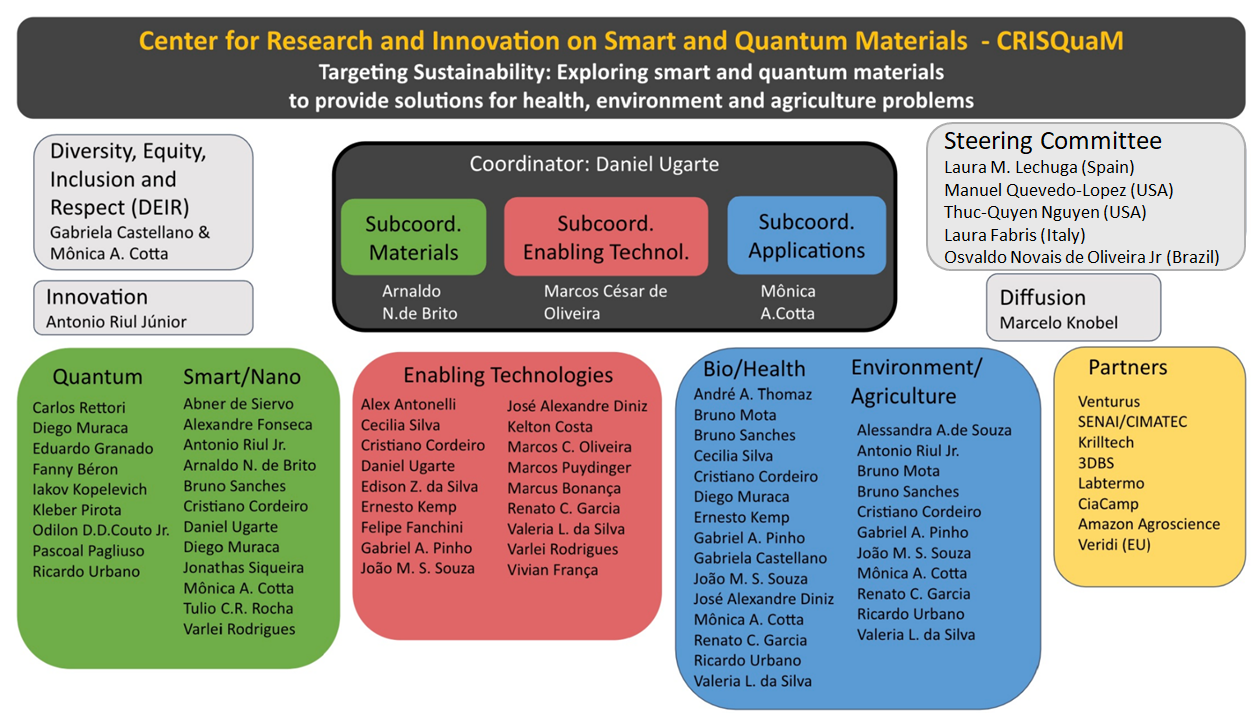BV-FAPESP: research projects supported in this Center
CRISQuaM in the Media: news about the center
CRISQuaM aims to explore the synergistic development of fundamental and applied science to create new materials with high potential for the construction of devices and sensors to address technological challenges related to sustainability, climate change, precision agriculture, ecology, and health. To achieve these goals, we have assembled an interdisciplinary and collaborative research team, integrating expertise across various scientific domains, researching novel materials with high innovation potential. By combining original synthesis methods, advanced characterization techniques, theoretical approaches, computational simulations, quantum technologies, and device construction designs, we aim to drive advances in smart and quantum materials, promoting scientific excellence and technological development. With this, we plan disruptive innovations in instrumentation—including hardware and AI-based tools—as well as in quantum technologies, biomedical devices, and signal processing, in addition to plant bionics, exploring plant-pathogen interactions. Besides research activities, we plan intensive actions in education, dissemination, and communication for the general public, as a modern society should be aware of the challenges humanity faces and how research and technology are essential for responsibly utilizing the planet's limited resources. CRISQuaM's Innovation activities are accelerated through partnerships with several companies in related technologies, many of them Brazilian. Finally, all activities of the Center are managed in accordance with diversity, equity, and inclusion goals and best practices.
The Center brings together scientists, engineers, and innovators in a collaborative effort to apply materials science and quantum technologies at the cutting edge, designing new materials and nano(bio)sensors for advanced diagnostics. The Center has a team capable of producing a wide range of (nano/micro) materials, along with precise chemical and physical characterizations using modern techniques (synchrotron, advanced microscopy, magnetotransport, magnetic resonance, optics, etc.). In addition, the team offers various options in enabling technologies, including miniaturization, processing, and additive manufacturing, as well as instrumentation, quantum sensing, and electronics development. Data analysis will employ updated approaches (numerical simulation, classical and quantum machine learning, and quantum optimization). Applications at the knowledge frontier will address urgent sustainability needs in environmental areas, precision agriculture, plant bionics, and biomedical interfaces, contributing to the development of local technologies in close partnership with the Brazilian industry.
The organization of the Center is based on three pillars — Materials, Enabling Technologies, and Applications — together with partner companies, as described in the figure below.

2024-09-25
Characterized by high pH and salinity, these water bodies have practically dried up because of rising temperatures, changing rainfall patterns, and wildfires. The findings show how the local microbial community and other factors influence greenhouse gas emissions.
2024-09-25
The process designed by researchers at São Paulo State University (UNESP) in Brazil and collaborators in Chile and Mexico results in low-cost raw materials and reduced environmental damage.
2024-09-25
In an article published in Perspectives in Ecology and Conservation, researchers affiliated with the National Space Research Institute (INPE) and the National Disaster Surveillance and Early Warning Center (CEMADEN) in Brazil discuss CO2 emission reduction challenges and solutions.
2024-09-18
A study by the University of São Paulo shows that expansion of cattle ranching to meet growing domestic demand has contributed more than any other driver to the elimination or degradation of the Amazon’s original vegetation, followed by expanding croplands and urbanization.
2024-09-18
Researchers at UNICAMP and other Brazilian universities, as well as 20 companies, are participating in the DUNE experiment. They are responsible for the argon purification and photon detection processes, without which the international mega-project would be impossible.
2024-09-18
The conclusion is from a study of 774 vegans conducted by researchers at the University of São Paulo in Brazil. An article reporting its findings is published in JAMA Network Open.
2024-09-18
Through morphological and molecular analysis of material collected from rivers in Brazil's Northeast region, the researchers are extending their knowledge of the evolutionary history of South American darters in the genus Characidium.